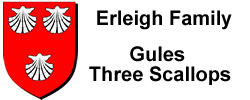The Erleigh / Earle Surname Ancient Origins
From the book titled
“EARLE OF ALLERTON TOWER”
By T. Algernon Earle – 1890
In a little volume entitled Knutsford and its Vicinity, by H. Green, there is a list of local Lancashire and Cheshire names, taken from certain old legal documents dated 1734, among which appears the name of Earle, written both with and without the final vowel. The author there derives it from the Danish Eorla, “senior”, and in speaking of the list, which contains sixty-four names, he goes on to examine the probable origin of them all.
” One name only in the list is Latin, five or six are French, i.e., Norman, and all the rest are taken from the language and circumstances of a people decidedly Teutonic or Scandinavian. The mark of antiquity is stamped upon them all; and inasmuch as this list is, I believe, an accurate type of the names of our Cheshire people generally, we arrive at the conclusion that essentially the vast majority of the inhabitants possess an ancestry far anterior to the battle of Hastings, and belong to what the last Earl of Bridgwater describes as “the old, genuine, original native families of England.”
The possibility occurs of a more ancient origin for the Earles than the Norman era stem, and that the Saxon name may imply Saxon blood: we must bear in mind, however, that surnames were not in very common use for some time alter the Conquest, and in looking for traces of our ancestors among the pristine inhabitants of Lancashire and Cheshire, or further north, we likely enough should not recognize them by our name of the present day.
In many cases where it occurs, it may have nothing to do with the Scandinavian or Saxon derivation; in old days it was the commonest thing to give a man a soubriquet, such as ” lak o”, “the Hey”, “Roger del Wode “, and even as late as 1465 we find these instances in an old rent roll of property belonging to the Legh family in Warrington.
The Erleigh surname comes from the reputed oldest family, which was prominent during the Norman era, but the original name is of more ancient origin.
The word ” Earle or Earl,” says Carter, in his Honor Rcdivivus (published 1673), “we had from the Saxons, from whence, till we borrowed the word Honor, we used the word Earl for ‘ gentle ‘ or ‘ noble ‘, and ‘ Ethel ‘ which was sometimes abridged to ‘ El ‘, so that of ‘ Ear-Ethel’ it was ‘ Ear-el’, and by the abbreviation ‘ Earl ‘, which the Dutch call ‘ Eorle.’ ” Primarily the word signified ” a man; a man of valour or distinction; then Afterward, a head, ruler, leader, or hero: Finally, a nobleman of ” the highest rank, equivalent to an Ealdorman, an Earl.”
There was an ancient term that was constantly used in the western counties of England for the Ered or plowed Ley, which the country folk called “Erly.” It appears at p. 99 of the seventy-fourth volume of the Chetham Society’s series,
” Rental of the Manor of Assheton-under-Lyne in 1422 William of the Woodfield for a lond at Erley 4s.”
It is not impossible that this William might become William of the Erley, and his children adopt the name after him, as doubtless was done in many cases by the ancestors of such families as the Heyes, Woods, Hills, &c., of today. However this may be, it is a curious fact that we find at the Heralds’ Office an old grant of arms to a Cheshire family of that name and spelled in that manner.
Was our Erleigh / Earle Surname SAXON?
There has been speculation that the Erleigh surname may be of Norman origin and that the family was, in fact, of Norman lineage and came to England with William the Conqueror in 1066.
The place-name of Herlei existed before the Norman invasion and our ancestors were more than likely SAXON, not Norman.
The name of Erilaz (Erilaz or Erilaʀ) is a variant of Earl and is also thought to be linguistically related to the name of the tribe of the Heruli, so it is probably merely an old Germanic military title.
Erilaz is likely the Proto-Germanic ancestor of Anglo-Saxon eorl (Modern English earl) and its relatives, meaning “man, warrior, noble”. The word erilaz is likely a derivative of *erǭ sb.f. “fight, battle”, thus the interpretation “one who fights, warrior”, though it has also been connected to *arô sb.m. “eagle”.
Historical instances:
- Latin: Heruli (dating from around 250 AD onwards)
- Greek: Eruloi (dating from around 250 AD onwards)
- Runic: Erilaz (dating from around 200 AD – 400 AD)
The name of the Heruli is sometimes spelled as Heruls, Herules, Herulians or Eruli.
The name Heruli was often written without “h” in Greek (Έρουλοι, ‘Erouloi’) and Latin (Eruli), and is sometimes thought to be Germanic and related to the English word earl (see erilaz) implying that it was an honorific military title. There is even speculation that the Heruli were not a normal tribal group but a brotherhood of mobile warriors, though there is no consensus for this old proposal, which is based only on the name etymology and the reputation of Heruli as soldiers.
